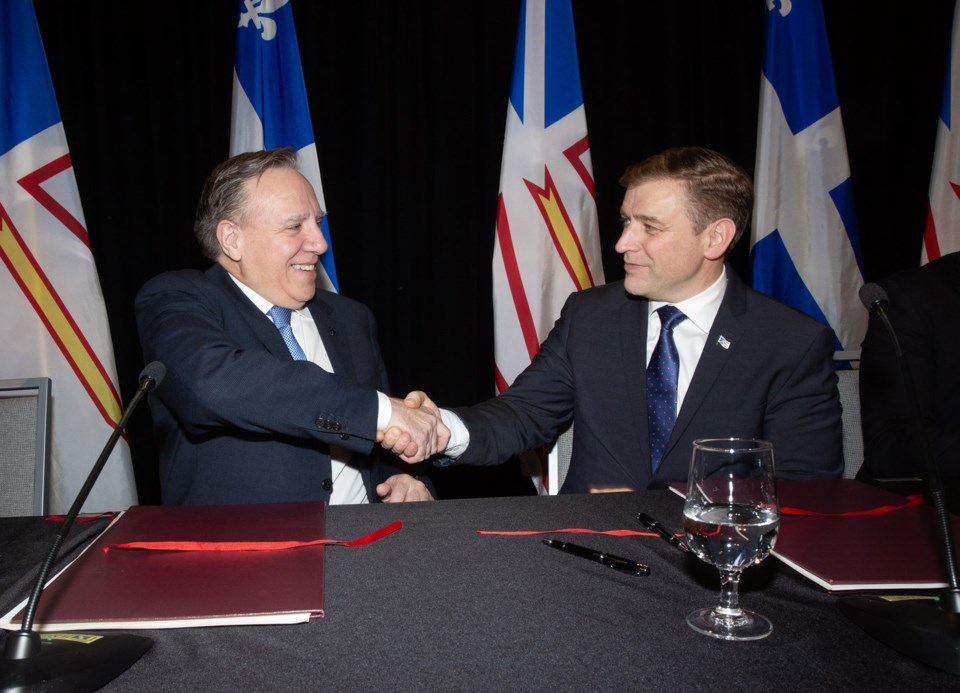ST. JOHN'S, N.L. — Quebec and Newfoundland and Labrador have signed a sweeping new deal to build new energy projects and throw out a decades-old contract that has long been a source of strife and bitterness for Canada's easternmost province.
The agreement in principle ends a contract signed in 1969 that allowed Quebec to buy cheap power from the Churchill Falls hydroelectric plant in Labrador, and it promises hundreds of billions in revenue for both provinces through a new, more equal partnership.
"Today, everything changes for Newfoundland and Labrador," Premier Andrew Furey said during a speech in St. John's, N.L., that drew several standing ovations. "Today, after more than 50 years of a lopsided agreement that has been such a contentious point for Newfoundland and Labrador, we finally have a new deal on the table for Churchill Falls with Quebec."
He picked up a copy of the 1969 agreement and tore it in half, as the audience of politicians and government officials cheered him on.
The Churchill Falls generating station is owned jointly by the two provinces' Crown-owned energy companies. Under the agreement signed in 1969, Newfoundland and Labrador owned most of the facility, but Quebec pocketed most of its profits, paying just 0.2 cents per kilowatt hour of electricity from the plant.
The contract was set to expire in 2041, but Thursday's memorandum of understanding between the two provinces will end it 17 years early. As of Jan. 1, Quebec will pay an average price of 5.9 cents per kilowatt hour, netting Newfoundland and Labrador Hydro about $1 billion per year until 2041.
Unlike the old deal, there are provisions in the new agreement allowing those rates to increase as the market changes.
The new contract also lays out a partnership between Hydro-Québec and Newfoundland and Labrador Hydro to upgrade and expand the current Churchill Falls facility and to build a new hydroelectric plant further down the Churchill River at Gull Island, a spot long eyed for development. The new deal is set to run until 2075.
Hydro-Québec will pay Newfoundland and Labrador Hydro $3.5 billion for the right to co-develop the projects in Labrador. It will also manage the construction of the Gull Island development and the Churchill Falls expansion, and absorb any cost overruns, officials said.
The agreement will yield more energy for both provinces, and more money. Furey said his province stands to earn about $200 billion, if all proceeds according to the document. "Two hundred billion new dollars — every time I say that I have to pause," he said.
"It's a win-win deal," Quebec Premier François Legault agreed. "$200 billion for Andrew, $200 billion for me."
The provinces plan to have a binding agreement in place no later than April 30, 2026, and Legault said he wants to "close the deal" as soon as possible. Once that happens, Quebec will pay the higher rates for Churchill Falls power retroactive to Jan. 1, 2025.
The Churchill River flows through traditional Innu territory in central Labrador. Innu groups in Labrador and Quebec have sued Hydro-Québec and Churchill Falls (Labrador) Corp., the entity that operates the generating station and transmission equipment, for destruction of land and culture caused by flooding.
But on Thursday, the Innu Nation in Labrador was on hand to sign the memorandum between the two provinces. Grand Chief Simon Pokue said the premiers have acknowledged the problems of the past, and he trusts they will include the Innu in future plans and benefits.
"They've acknowledged that this is our land," Pokue told reporters.
Hydro-Québec President and CEO Michael Sabia said the projected expansion and construction would create the second-largest hydroelectric complex in North America, after Hydro-Québec's James Bay facility.
Quebec could have waited for the deal to expire in 2041, he said. But it is facing massive demand for energy, and the new agreement provides predictability for the future as electricity costs rise.
"The passage of time is not Quebec's friend, because with the passage of time, every year that goes by from now to 2041, to be blunt, our leverage in negotiations goes down," Sabia said. "The closer you get to 2041, the fewer options we have to replace that power, because time is running short."
Legault agreed that the contract signed Thursday corrected a bad situation for Newfoundland and Labrador and created a good situation for Quebec.
"Newfoundlanders will get a better price," he said. "I want in 50 years that our grandchildren will be happy about this deal. That's the target."
For Furey, the agreement ends a dark period in Newfoundland and Labrador, laying to rest decades of questions about where the province might be now if it hadn't signed that contract in 1969.
"This is our moment," he said. "It wears no political stripe. Its only agenda is to right a historic wrong."
— With files from Sidhartha Banerjee in Montreal and Michael MacDonald in Halifax
This report by The Canadian Press was first published Dec. 12, 2024.
Sarah Smellie, The Canadian Press



